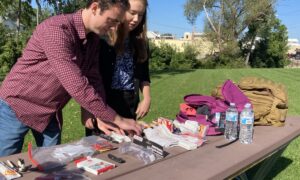On January 12, 2010, the Haitian city of Port-au-Prince was struck by a devastating earthquake with a magnitude of 7.0. Many buildings collapsed, including hospitals, schools, the headquarters of the United Nations mission, and sections of the presidential palace. More than 225,000 deaths resulted. Not knowing where to go for refuge, people poured into the streets and for weeks afterward camped in any open areas they could ?nd. This proved wise, as aftershocks rocked the city, including one of 6.1 magnitude that occurred on January 20.
The best place to seek refuge is always a question when a calamity strikes. Should one stay put or move? What location will prove safest? Who can be turned to for help? Decisions are easier when just a relatively small area is a?ected. But what if the calamity is widespread, even global?
Those who think that a global calamity is far-fetched need to consider the Flood and Jesus’ warning: “Just as the days of Noah were, so the presence of the Son of man will be.” And did not Jesus say that unless the great tribulation was cut short, “no ?esh would be saved”?—Matt. 24:22, 37. Also of note is the prophetic account in Revelation chapter 16. In verse 14, we learn that demonic expressions “go forth to the kings of the entire inhabited earth, to gather them together to the war of the great day of God the Almighty.” The prophecy goes on to relate that “a great earthquake occurred such as had not occurred since men came to be on the earth, so extensive an earthquake, so great.” (Rev. 16:18) While those statements are symbolic in nature, they do indicate that destructive events of global proportions are coming and that there is a great need to seek a place of refuge. And Jehovah has promised such refuge for those who seek him in true faith.—Zeph. 1:14, 15, 18; 2:2, 3.
Even now, before those foretold events occur, there is a need to ?nd refuge. Why? After foretelling the Devil’s defeat and his ouster from heaven at the time of the Kingdom’s birth in 1914, the Bible relates that Satan—full of wrath and con?ned to the vicinity of the earth—goes o? to wage war with those “who observe the commandments of God and have the work of bearing witness to Jesus.”—Rev. 12:17.
A powerful, invisible enemy who is aware of our personal weaknesses is a fearsome foe indeed. But there are those who are more powerful than Satan, foremost of whom is Jehovah God. What better stronghold, what better place of refuge, could there be than in the protection of the Almighty One himself? With inspired wisdom, King Solomon wrote: “The name of Jehovah is a strong tower. Into it the righteous runs and is given protection.”—Prov. 18:10.
The Hebrew prophet Joel cited the saving power of Jehovah’s name when he wrote: “Everyone who calls on the name of Jehovah will get away safe.” (Joel 2:32) The apostle Peter con?rmed this when the Christian congregation was founded on the day of Pentecost 33 C.E. Peter said: “Everyone who calls on the name of Jehovah will be saved.” (Acts 2:21) Years later, the apostle Paul made the same point. (Rom. 10:13) Today, it is Jehovah God in whom we too must ?nd refuge. He will prove to be our unconquerable stronghold!
As the name Jehovah (meaning “He Causes To Become”) implies, God will prove to be whatever is needed in any circumstances. He will do so for the sake of his people and in line with his purpose. Jehovah can meet any challenge successfully. There is no greater refuge in these trialsome times. It is with this in mind that the Governing Body has chosen as the yeartext for 2011 these words found at Zephaniah 3:12: “Take refuge in the name of Jehovah.”





